‘Enhancing close relations with Korea is among top priorities of our foreign policy’
Ambassador Andrei Popkov of the Republic of Belarus in Seoul said, “Korea was among the first countries to recognize independent Belarus, we established diplomatic relations 27 years ago, and enhancing of the close bilateral relations is among the priorities for the Belarusian foreign policy.”
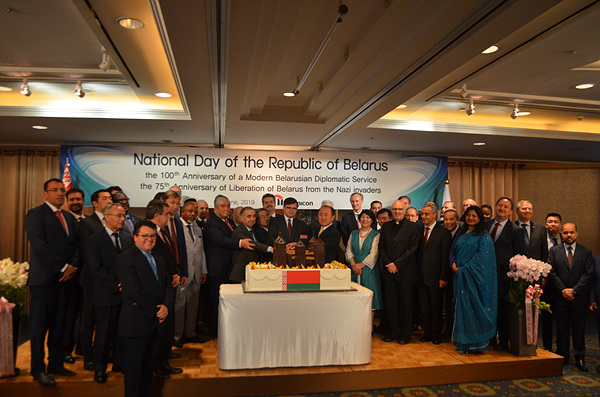
Speaking at a reception he and Madam Popkov hosted at the Millennium Seoul Hilton in Seoul on June 28, 2019 in celebration of the National Day of Belaraus, Ambassador Popkov stated, “Our relations are based on deepening political, economic, scientific and cultural ties and consolidating positions on the current problems of international peace and security. Belarus supports the efforts to bring a lasting peace to the Korean peninsula.” Then he stressed the importance of preventing the proliferation of nuclear weapons and forwarding the inter-Korean dialogue.
Ambassador Popkov’s remarks were so fitting and encouraging to the Korean ears, especially the peace-loving people of South Korea, in the fact that Belarus is a truly model country in the world upholding peace by voluntarily giving up her nuclear weapons and potential which were quite advanced in the region.
Ambassador Popkov also noted the importance increased cooperation in the innovative and other fields for benefitting the Fourth Industrial Revolution and digital transformation of economies, especially, in such fields as artificial intelligence, biotechnologies, electric and self-driving vehicles, robotics and electronics, nano-materials, precise engineering, chemical and petrochemical industries and ICT.
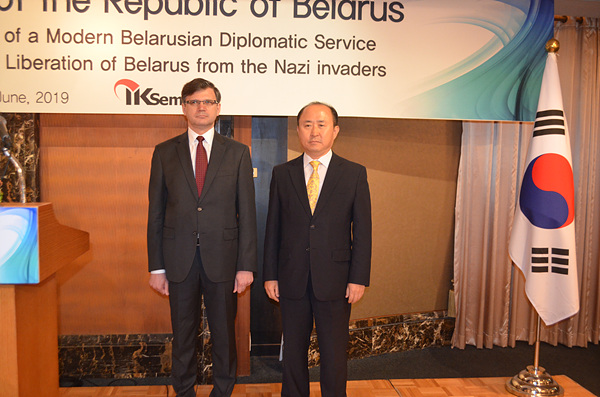
He said that Korea represented a good example for Belarus as to how to rebuild itself with the use of innovative technologies and find progressive solutions for all critical challenges of economic growth. (See excerpts from the speech of Ambassador Popkov.)
The reception was attended by many distinguished guests from within Korea and from many other parts of the world, especially the ambassadors from the countries diplomatically represented in Seoul.
Among the Korean guests in attendance were Deputy Minister Yun Kang-hyeon of Foreign Affairs of Korea for Economic and Foreign Relations Coordination, Korean Honorary Consul Yoon Kyung-duk for Belarus, and representatives from various segments of Korean society, including the mass communications media, whence came Publisher-Chairman Lee Kyung-sik of The Korea Post media. Lee owns and operates 3 English and 2 Korean news publications for the past 34 years after retirement from The Korea Herald as Cultural Editor.
Ambassador Popko’s speech was followed by a congratulatory address by Deputy Minister Yoon.
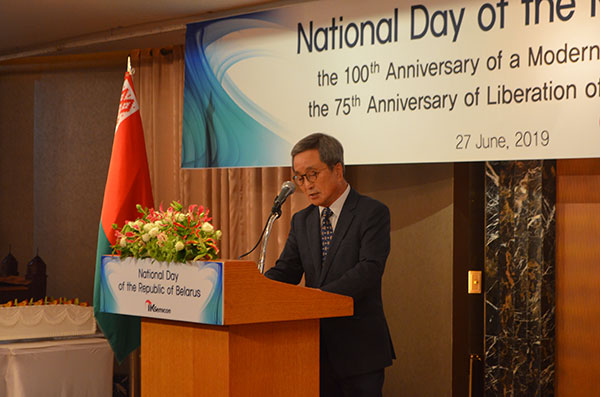
He said in part that Korea and Belarus cooperated very closely in various areas including new materials, nano, chemical industry and machinery.
In particular, he noted the SK Hynix R&D Center in Belarus which, since establishment in 2017, has been producing excellent results in various areas, including IT.
Then there were congratulatory remarks also by Korean Honorary Consul Yun Kyung-deok. He said in part: “On this special day we celebrate a number of significant events in the Belarusian history. Belarus is a country that endured great challenges and, like Korea, managed to rebuild itself and became an active and responsible member of the international community.
Then he said, “During 27 years of diplomatic relations Belarus and Korea have made a significant progress in various areas of cooperation including science and technologies, IT, e-governance, industry, etc.”
He said that he was confident that the two countries had great potential for strengthening bilateral ties through academic, cultural and business exchanges.
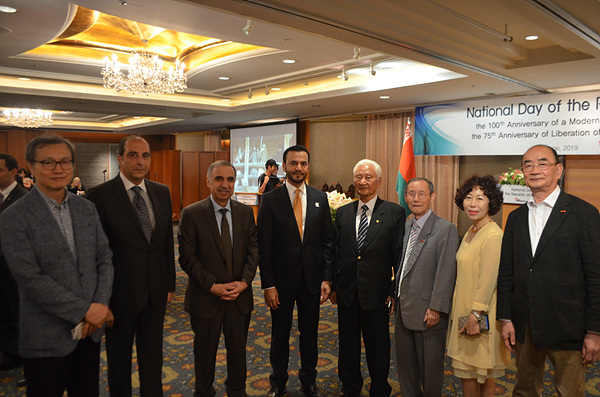
Excerpts from the speech of Ambassador Popkov:
I am honored to greet all of you today at the Belarus National Day reception. This year is a very special for us because we celebrate several significant events of the national history.
75 years ago, in July 1944, the Soviet Army’s large scale Belarusian Offensive operation “Bagration” completed the liberation of the Belarusian territory from the Nazi occupation during the Second World War. July 3, 1944, the day when our capital – Minsk became free of the Nazi invaders, was recognized as the official Day of Liberation of Belarus. The decision to celebrate the Independence Day of the Republic of Belarus (Republic Day) on July 3 as a main state holiday was taken by nationwide referendum in 1996.
Belarusians fought side-by-side together with the peoples of other nations and allied troops. The country paid a high price for the victory. More than 2 million of its inhabitants perished in that heroic and difficult struggle with fascism. The post-war healing and reconstruction required tremendous efforts of the whole nation and could not be also possible without help from friendly nations.
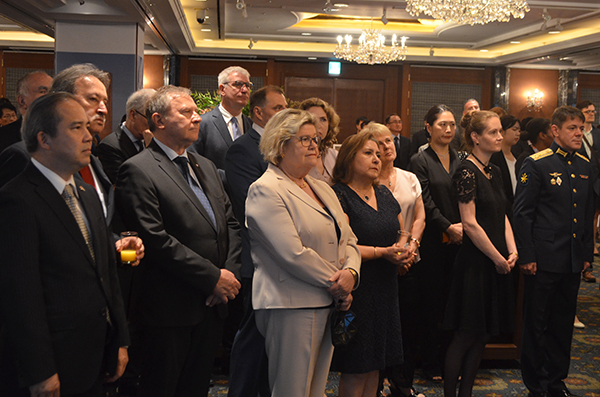
The memory about wars that affected the territory of Belarus, pain of loses and respect for the heroism of our ancestors define the peace-loving policy of the country, its strong adherence to the primacy of international law, freedom of self-determination and equal sovereignty of nations.
These values constitute the bedrock of Belarusian modern diplomacy, the centenary of which we celebrate this year. The beginning of the modern history of Belarusian diplomacy coincides with the formation of the Commissariat for Foreign Affairs of the Socialist Soviet Republic of Belorussia in January 1919 with the choice of Minsk for its location.
Polotsk, Turov, Pinsk and other principalities, that were established on the territory of modern Belarus in IX-XIV centuries, and their successor – the Grand Duchy of Lithuania in mid. XIII-XVIII centuries were active participants of international relations and maintained diplomatic intercourse with many then states. Many representatives from Belarusian lands went into diplomatic service of Rzeczpospolita and the Russian Empire. All of these factors paved the way for the Belarusian diplomacy in the modern era.
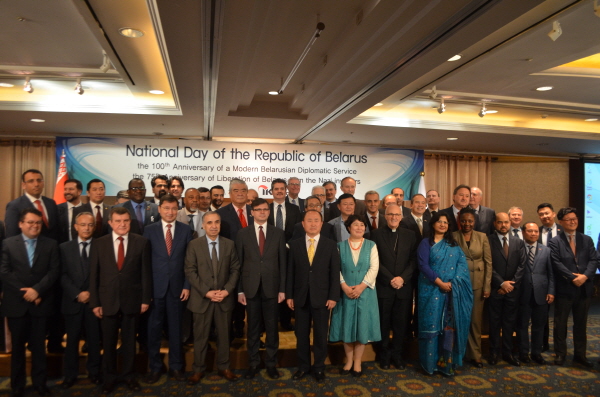
The initial attempts of national diplomatic activities were undertaken in 1918 with the proclamation of the Belarusian People’s Republic. In retrospective, the adverse situation and controversies in our region made them a non-starter. The most important milestones in the history of the Belarusian diplomacy belong to the period of the Byelorussian Soviet Socialist Republic (1919-1990), which became a full-fledged and founding member of the United Nations.
With the formation of the Foreign Ministry of the Republic of Belarus in 1990, national diplomacy continued to develop together with a young independent state. As of today Belarusian interests are represented by foreign offices in 57 states and taking into account ambassadors with concurrent accreditation – in 109 states.
Over the years the Republic of Belarus has made significant progress on the international arena while pursuing the multi-vector policy aimed at the development of friendly relations with all countries without geographic constrains.
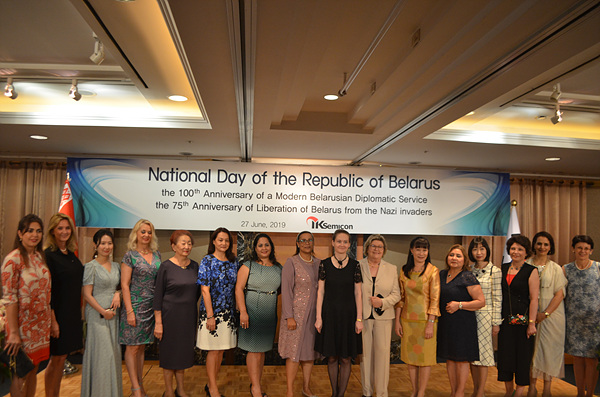
Belarus became a participant of new integration projects in Eurasia, authoritative international organizations and forums, expanded the range of its foreign partners and allies, entered new markets. Belarus contributed to the strengthening of security and stability in the region and the world more than once, in particular, through the voluntary dismantling of its nuclear arsenals inherited after the Soviet Union.
The vivid confirmation of the stated accomplishments is a constructive and mutually-beneficial cooperation between the Republic of Belarus and the Republic of Korea. The Republic of Korea was among the first countries to recognize independent Belarus. We established our bilateral diplomatic relations 27 years ago. The enhancing of relations with the Republic of Korea is among the priorities for the Belarusian foreign policy in Asia.
Our relations are based on deepening political, economic, scientific and cultural ties and consolidating positions on the current problems of international peace and security. Belarus supports the efforts to bring a lasting peace to the Korean peninsula, prevent the proliferation of nuclear weapons and forward the inter-Korean dialogue.
We are hopeful about the perspectives of increased cooperation in innovative and other fields for benefitting the Fourth Industrial Revolution and digital transformation of economies, especially, in such fields as artificial intelligence, biotechnologies, electric and self-driving vehicles, robotics and electronics, nano-materials, precise engineering, chemical and petrochemical industries and ICT. The Republic of Korea represents a good example for us how to rebuild itself with the use of innovative technologies and find progressive solutions for all critical challenges of economic growth.
Our countries exchanged views on the promising directions of cooperation at the fifth meeting of the joint intergovernmental committee in September 2018 in Seoul and at the third meeting of the committee on sciences and technologies in Minsk in April 2019. The faithful implementation of plans agreed together with interested parties from the scientific and business communities can create a new opportunities for advancing and diversifying bilateral relations in many areas in the context of the New Northern Policy carried out by the administration of the President of the Republic of Korea Н.Е. Mr. Moon Jae-in.
We also expect further steps to broaden inter-parliamentarian cooperation, official, business and people-to-people exchanges as well as the simplification of travels for our nationals and launching mutual visa-waver regimes.

